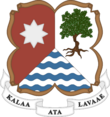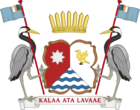Maaita of Freice
| Má’ita of the State of Freice | |
|---|---|
 National emblem of Freice | |
 Flag of Freice | |
Incumbent Kána Talakel since 30 January 2023 Joint hereditary officeholders
| |
| Style | My Lord (formal, address) |
| Appointer | Representative Council |
| Term length | At the Council's pleasure |
| Inaugural holder | Tuá Kálalek |
| Formation | 1872 |
| Succession | Hereditary |
 |
|---|
| This article is part of a series on the politics and government of Freice |
|
Má'ita [a] (lit. 'He who Leads') is the title of the head of state of the State of Freice, an island country in the Kaldaz Sea. The title was first written into the 1917 constitution, enacted under the supervision of Riamo, although the position had been in existence since 1872. In the Common Language, the title is sometimes translated as "Leader" or "Ruler" and, more rarely, as "President" or "King".
The position was created by agreement of the three main chiefs of the island: Tuá Savou, Matásat Tailávu, and Téakála Néet. Under the agreement, first codified in 1917, the office is hereditary and is held in gross by the chiefs and their lawful descendants. Formally, the office is held by all legal claimants (currently seven), but is exercised by a single claimant for a period of time agreed by all.
The current Má'ita, since 30 January 2023, is Kána Talakel, who succeeded as the sole claimant to the Tuá share.
Description
Role and responsibilities
The Má'ita is designated Freice's head of state and maintains a role similar to that of a constitutional monarch. Under the constitution, the Má'ita is responsible for the following:
- Issuing the decree appointing the President of the Representative Council.
- Issuing the decree appointing committees, co-signed by the president of the Council.
- Promulgating laws (countersigned by the president of the Council).
- Countersigning the ratification of treaties in the Council.
Although má'itas had historically played a significant role in politics, modern má'itas have maintained a hands-off approach, fulfilling a more ceremonial position. The constitution continues to grant the office a practical function within the political system, but this function is now exercised on the advice of and at the direction of elected representatives.
Succession
The position is hereditary and possession is held by the inheritors of the three shares initially granted to the three chiefs. Each share constitutes a third of the whole office, with each inheritor possessing a proportion of their share. Under the constitution, holders of the office may designate one or more of their family to inherit their share, and may divide their share as they see fit. Where there are multiple holders of a share, they are required to nominate one of their number to be a "deputy of the share" and to hold the office in their name.
Under the constitution, the office is rotated amongst each share every ten years. If an incumbent dies during their term, their designated successor to their share takes on the post, rather than the position transferring to another share. If they are a nominated deputy, holders of that share nominate a new deputy to complete the term.
Officially, the Má'ita is appointed by the Representative Council, but this is a formality which the council is constitutionally required to do. Women face no barrier to succession, beyond the personal prejudices of the Má'ita, and there have been a number of female incumbents, who rule with the title of "Má'vine" ('She who Leads')
The Má'ita does not possess any distinct style or title beyond that of Má'ita. However, they are commonly addressed as "My Lord" or "My Lady" in the case of a Má'vine.
Status
Under the Constitution of Freice, sovereignty is explicitly vested in the people. The head of state is not defined as being of republican or monarchical nature, and various constitutional mechanisms and procedures frustrate an easy categorisation. The position is formally hereditary, but the incumbent is de jure appointed by the Representative Council and serves at its pleasure. The Má'ita is also denied many of the customary privileges of monarchy, including a royal style and an enthronement or coronation.
A number of Kaldaist scholars and writers have characterised the position as more akin to an aristocratic system of government, with the various joint-holders of the office compared to feudal hereditry lords.
Má'itas and Má'vines of Freice
- Tevé Ennédi* (2013-2023)
- Kána Talakel (2023-present)
An asterix (*) designates a nominated deputy.
See also
Notes
- ↑ Alternatively written as "Ma'ita" or "Maita"
